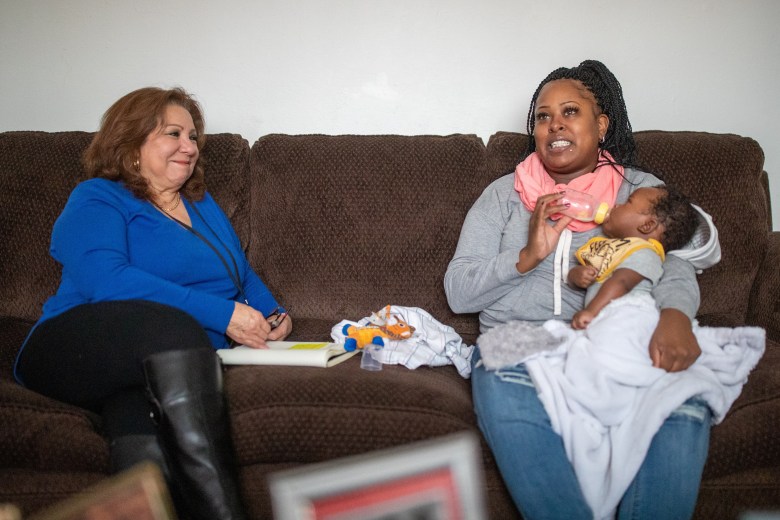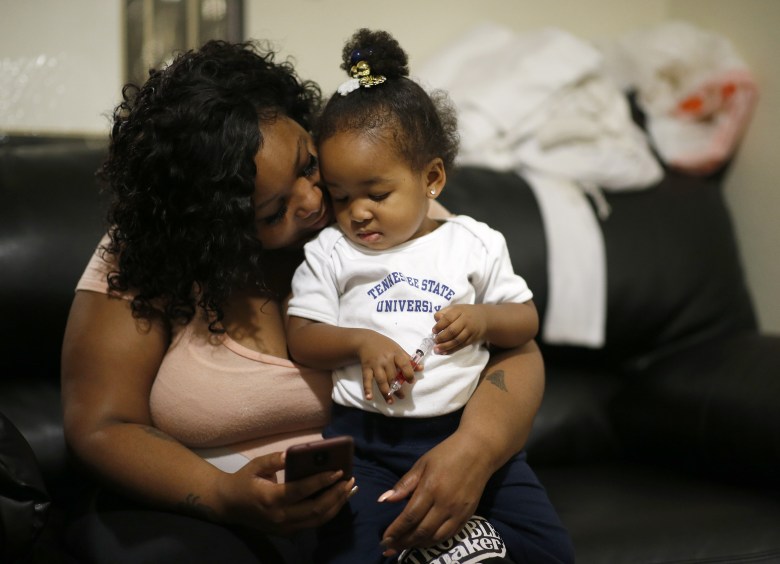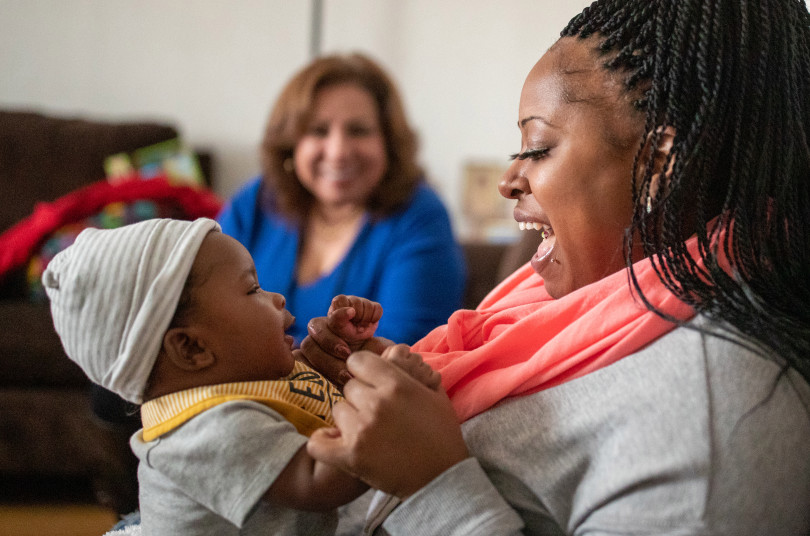Photo: SAN LORENZO, CA – DECEMBER 10: Cieara Porter plays with her 4-month-old baby Mekhi Flores as her psychotherapist Maria Pilecki of Alameda County’s Blue Skies program looks on during a therapy visit at their home in San Lorenzo, Calif., on Tuesday, Dec. 10, 2019. Porter is a new mom who struggles with depression and has a speech impediment. She lives with her mom and grandma, and is receiving help through Alameda County’s Blue Skies program.(Ray Chavez/Bay Area News Group)
Editor’s note: This story was first published in the The San Jose Mercury News on Jan. 7, 2020 and written by Claudia Boyd-Barrett.
More than a quarter of the approximately 90 women served by the county’s Blue Skies program each year are homeless or housing insecure.
Cieara Porter sat on her mother’s living room couch in San Lorenzo, holding her sleepy four-month-old son, Mekhi, on her lap.
It was Tuesday evening, and therapist Maria Pilecki had just arrived from the Alameda County Department of Public Health. For weeks, she’d been meeting with Porter to help her cope with depression symptoms that flared during her pregnancy.
“How are you?” inquired Pilecki, settling herself next to Porter, and holding a finger out to allow the baby’s little hand to curl around it.
“Just taking it day by day,” said Porter, 33. “You have your moments when you want to cry, but then you just suck it up.”
“Crying isn’t always bad,” Pilecki reassured her. “Sometimes you just need to get it out.”
Porter is one of many new and expectant moms who suffer from prolonged depression during pregnancy or after giving birth, a condition referred to as perinatal or postpartum depression. It’s surprisingly common, affecting more than one in 10 California women on average. But among low-income women like Porter, a single mom who survives on a part-time caregiving job and lives with her mom and grandma, the rate is almost one in five.
Yet unlike most women who struggle with pregnancy-related mood disorders, Porter doesn’t have to travel to a clinic for treatment. Instead, Pilecki visits Porter — who doesn’t own a car — at her home twice a month.
The in-home therapy sessions are free, and part of a pioneering program called Blue Skies, an experiment launched by the Family Health Services Division of Alameda County’s Department of Public Health in 2017. The division oversees several other home visiting programs for pregnant and new mothers focused on parenting and child health. Nurses and outreach workers in those programs screen women for depression and anxiety and make referrals to Blue Skies, which then sends licensed therapists to meet with them, wherever they are.

Often, the visits don’t happen in a typical home. More than a quarter of the approximately 90 women served by Blue Skies each year are homeless or housing insecure. They live with their children in shelters, cars, garages, on friends’ couches, or doubled up with other families. The problem has grown more dire as the Bay Area’s housing costs spiral out of reach for low-income families. As a result, Blue Skies therapists often have to get creative, holding sessions in vehicles, at libraries, public parks, fast-food restaurants, and community centers.
“Regular therapy is going to the office of the therapist,” said Pilecki, who works with 12 to 15 women at a time. “We go to find the client wherever they are.”
The therapists work with the moms for up to a year — weekly at first and then twice a month. If they need ongoing treatment after that, they’re connected with the county’s behavioral health agency.
Experts say it’s important that pregnant women and mothers with mental health problems get prompt treatment. Perinatal mood disorders such as postpartum depression can be debilitating, and also interfere with a mother’s ability to care for and bond with her baby. Children whose moms have postpartum depression can suffer delayed language development, learning and behavior problems, and difficulty sleeping and eating. One therapist described how some moms she meets are so depressed they don’t even have the energy to take their other children to school.
“When a mom is depressed, she can’t connect emotionally with her baby. The baby is smiling at her, and she doesn’t smile back. She doesn’t play with the baby,” said Pilecki. “She doesn’t respond when the baby cries, and the baby can be crying for a very long time. That’s very damaging for the baby’s emotional development.”
Moms have their babies with them during the therapy sessions, and the therapists encourage them to hold them close, respond to their cries, and sing and talk to them. For her recent meeting with Porter, Pilecki also brought an educational peek-a-boo toy, to encourage Mekhi’s brain development.
Many of the women are wrestling with other problems too, such as domestic violence, broken relationships, and a history of abandonment or abuse by their own parents. These situations can make them more susceptible to mental health disorders during and after pregnancy, said Rita Lang, the marriage and family therapist who founded the program. Some already suffer from mental health difficulties before getting pregnant.
“A lot of these moms would never get therapy, and they’d never get it for free,” said Lang. “They’re just trying to survive. They’re not thinking about their relationship with their child or personal development.”
Lang developed Blue Skies after joining the county health program as a contractor seven years ago. At the time, the county wanted to explore the idea of integrating mental health care into its existing home visiting programs. Public health nurses were frequently encountering women with obvious signs of depression: They cried constantly, couldn’t get out of bed in the morning, or sat at home all day with the blinds drawn. But the nurses didn’t have the skills to handle it.
With the help of a federal grant obtained through the Alameda County First Five Association, Lang began visiting women in East Oakland that public health nurses identified as needing help. She found moms who were falling apart emotionally, often in precarious living conditions or abusive relationships, unable to properly care for themselves or their children.
“I was like, ‘wow’,” Lang said. “The need was so great in that community, and continues to be. The moms were so depressed, so overwhelmed with day-to-day survival that often the baby was just an afterthought… I had to start thinking, what can make a difference.”
Lang gradually brought on two more full-time therapists, and a part-time addiction specialist. Another part-time therapist is expected to join the team soon. Today, the county has made Blue Skies a permanent program, with a budget of around $500,000 a year. Funding comes from a mix of federal grant money, California Mental Health Services Act dollars, and Medi-Cal.
Other California counties have taken note of Alameda’s success. Lang has served as a consultant to San Francisco, Fresno and Nevada counties on how to embed mental health care into their home visiting programs. As a result, San Francisco has hired three therapists to work with moms both individually and in groups, and to help home visitation workers identify mental health needs. The county dedicated general fund money to continue the effort after federal grant funding ran out because officials agreed the work was so valuable, said Diane Beetham, director of public health nursing for San Francisco’s Department of Public Health.
“It’s critically important,” Beetham said. “I think that this is a really good model for helping get the services directly to these mothers.”
Santa Clara and Contra Costa counties don’t have mental health home visitation programs specifically targeted to new and expectant moms. But San Mateo County runs a comprehensive, $5-million behavioral health program for mostly low-income pregnant women and those with young children that provides in-home and clinic-based therapy with the help of over 20 staff, including licensed therapists, social workers, and a psychiatrist. Noelle Bruton, unit supervisor for the program, called “Pre-to-3,” said the initiative started in 1996 and is funded through a mix of grants and local taxes.
In Alameda County, much of the therapy focuses on helping moms figure out what’s causing their depression, and finding solutions. Therapist Simone Taylor, who’s worked at Blue Skies for three years, said she encourages clients to envision what they want for themselves and their children, and take small steps to get there. She refers them to resources such as food assistance and support groups. She tells them their experience handling adversity is actually a source of strength.
“I do a lot of pumping them up,” Taylor said. “It’s setting a foundation of trust, and that I’m here for you. A lot of these moms … feel like they have no one to help them or care about them.”

Sheri Roberson, 30, of Oakland was going through multiple crises when a county caseworker referred her to Blue Skies in 2017. At the time, Roberson was pregnant with her daughter, Azarieyah, now 2. She’d just lost her job at a local youth center, was living at home with her mom, and in an abusive relationship with her daughter’s dad. She’d also suffered a previous stillbirth, and was terrified her new pregnancy would end the same way.
“I was trying my hardest not to stress, but I just couldn’t help it,” Roberson said. “I felt like my life was going downhill.”
Roberson met with Blue Skies therapist Taylor, who helped her extricate herself from the relationship with her boyfriend, and focus her energy on taking care of her health and pursuing her dreams, including going back to school. She encouraged Roberson to take time for herself by going for walks and getting fresh air, and to not feel ashamed about what she’d been through.
In May, Roberson graduated from Cal State East Bay with a Bachelor’s degree in sociology, and is now working as a behavioral technician for children with autism. She and Azarieyah recently moved into their own apartment.
“I feel like I’ve come a long way,” said Roberson, who hopes her story can serve as an example for other women like her. “You can make something of yourself, regardless of your environment, regardless of what the statistics say.”
Claudia Boyd-Barrett writes for the Center for Health Reporting at the USC Schaeffer Center for Health Policy & Economics. Reporting was supported by a grant from First 5 LA.

You must be logged in to post a comment.